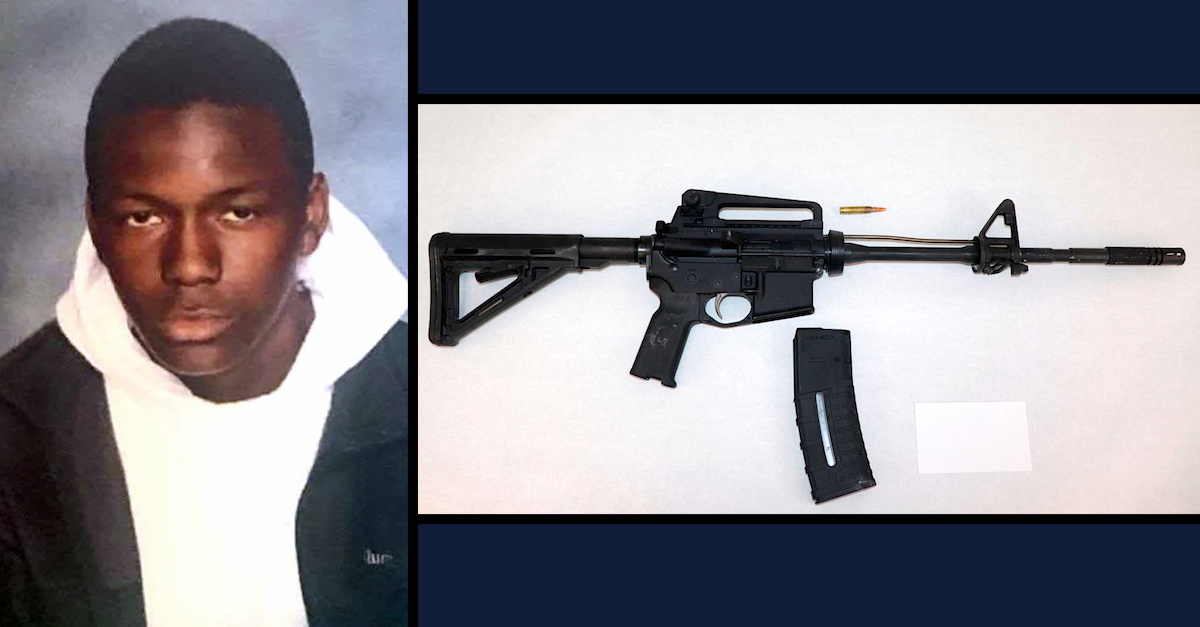
Orlando Harris (left) appears in a yearbook photo. The gun he used (right) to kill two and wound several others in a high school was photographed by the St. Louis Police Department.
The 19-year-old who shot and killed one student and one teacher at a St. Louis school had received mental health treatment several times and was committed to a mental institution at least once, according to the police. His parents also called the police multiple times over concerns about his mental health and his access to a gun, the authorities said.
“They contacted us and said that he had a firearm,” St. Louis Interim Police Chief Michael Sack said on Wednesday while referencing the parents of shooter Orlando Harris.
Harris was killed by the police during the shootout.
“The mother at the time wanted it out of the house,” Sack reportedly said of a gun that was of concern to the family. “The officers, in their response, handed it over to somebody else, an adult who was lawfully able to possess it.”
That incident, which police described as a domestic disturbance call at the home of Harris’ family, occurred around 5 p.m. on Oct. 15 — nine days before the school shooting — according to St. Louis NBC affiliate KSDK.
The constabulary initially suggested that the gun in question may have been the same gun Harris used to kill health teacher Jean Kuczka, 61, and student Alexandria Bell, 15.
“It could’ve possibly been this gun,” Sack said earlier in the case. “The mother at the time wanted it out of the house, so they facilitated that . . . this other party had it. How he acquired it after that we don’t know. That’s what we’re looking into.”
St. Louis police later on Wednesday confirmed that the AR-15-style rifle used in the shooting was, indeed, the same weapon Harris’ mother wanted removed from her home, according to St. Louis CBS affiliate KMOV.
Witnesses said Harris shot his way into Kuczka’s classroom and killed the teacher as she attempted to protect students. Three girls and four boys were reportedly injured. Bullets narrowly missed Dean of Arts Manfret McGhee.
Harris had armed himself with “more than 600 rounds of ammunition on his person,” Sack said, and brought one gun — the AR-15-style rifle — to the school.
Harris wore seven magazines of ammunition in a “chest rig,” held eight in a “field bag that he had carried,” and had “dumped” other magazines throughout the building — apparently as the shooting continued, according to Sack.
The police chief said a handwritten document found in the shooter’s car expressed some of the shooter’s rationale for carrying out the deadly attack.
Sack read some of the document:
I don’t have any friends. I don’t have any family. I’ve never had a girlfriend. I’ve never had a social life. I’ve been an isolated loner my entire life. This was the perfect storm for a mass shooter.
The gunman also wrote that his family did not know of his plans and that the family did not have access to the notebook in question, Sack reportedly said.
According to CNN, KSDK, and KMOV reports, Harris’s family told the authorities that they had sought mental health services for Harris on multiple occasions, checked the teen’s mail, monitored his whereabouts, and became increasingly concerned when Harris obtained a gun.
“They would search his room on occasion because they were concerned,” Sack said of Harris’ family. “hey were constantly in touch with the medical providers who were providing medical care for him.”
The chief suggested that the parents had “done everything that they couldn’t possibly done, but sometimes that is not enough.”
“I’ve got to give credit to the family,” the police chief reportedly continued. “They made every effort that they felt that they reasonably could. And I think that’s why the mother is so heartbroken over the families that paid for his episode.”
As Law&Crime has pointed out in the past, mental health solutions to mass shootings are difficult to implement.
One of the many police press conferences is below via YouTube and KSDK: